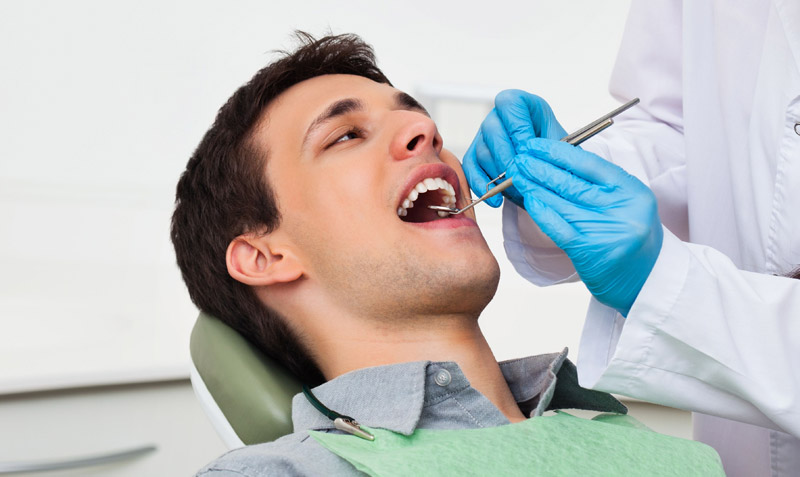Preventive Services
In addition to getting the professional care you need to prevent problems like tooth decay and gum disease, you also need to practice robust oral hygiene habits at home. Daily brushing and flossing make essential contributions to your oral health.
Keep in mind that not only will your smile benefit when you receive routine dental care regularly, but your body gets a boost as well. A healthy smile truly is the gateway to a healthy body, as poor oral health is associated with various illnesses, like heart disease, diabetes, and depression.
Routine Exams and Cleanings: The Foundation of Good Oral Health
Ideally, the only reason you will ever need to visit our office is for your biannual exam and cleanings. These services are valuable tools to protect your health and wellness for many reasons.
Most oral diseases are progressive in nature. This means that they get worse as time passes when left untreated. When a dentist is examining your smile every six months, it greatly increases the chances of catching a problem in its earliest stages, when it’s easiest to treat.

Longer intervals in between checkups can result in a problem that is far more advanced and serious by the time you get treatment for it.
Your semi-annual exams also include oral cancer screenings, and in this case, seeing your dentist on time can save your life. Oral cancer that is diagnosed and treated while the tumor is still localized has a good prognosis, but if you don’t catch it until after it has spread, the risks increase dramatically.
The cleanings that you receive at your twice-yearly checkups are valuable, too, even if you are diligent about brushing and flossing daily. You still may accumulate plaque and tartar in hard-to-reach areas of your smile, and the dental hygienist can use professional-grade instruments to remove that buildup.
Additional Preventive Interventions
Some patients may benefit from additional preventive services in addition to professional teeth cleanings. Other interventions that can help to maintain your smile include:
Dental Sealants
Protect cavity-prone surfaces of the teeth.
Topical Fluoride Treatment
Facilitate remineralization of the teeth to make them stronger and more durable
Athletic Mouthguards
Protect the teeth from damage due to injuries while playing contact sports or engaging in other high-risk activities
Nightguards
Protect the teeth from damage that can result from grinding or clenching the teeth during sleep; Also alleviate muscle strain that results from that condition
If you feel that you would benefit from any of these supplemental preventive services, be sure to ask about them at your next checkup.
How To Keep Your Smile Healthy Between Exams and Cleanings
You’re probably aware that daily brushing and flossing will help to keep your teeth and gums in optimal condition between dental appointments, but are you sure that you’re completing those tasks properly? Keep in mind the following tips for your technique.
- Angle your brush along the gum line, where tartar can accumulate fairly easily.
- Brush twice a day, for a full two minutes each session. Floss before at least one of your brushing sessions.
- Brush in a circular motion on the front and back surfaces of teeth and go back and forth over the chewing surfaces.
- Use a firm but gentle touch. If you apply too much pressure, you can accelerate wear and tear on your teeth.
The condition of the tools you use in your oral hygiene routine matters as well. Your toothbrush should be:
- Soft-bristled
- No more than three or four months old
- Easy to grip and handle
You may also want to consider an electric toothbrush to clean your teeth more thoroughly. Many electric toothbrushes even have a timer so you’ll know that you’re brushing for the full two minutes.
Common Preventive Dentistry Questions
Why should I go to the dentist regularly?
Your oral health is an instrumental component of your overall well-being, and you should do everything possible to minimize your risk of oral diseases. Seeing your dentist every six months will help you do this. The teeth cleanings provided at those visits help to reduce the presence of disease-causing oral bacteria. Furthermore, your dentist can spot concerning symptoms far earlier in the disease process when inspecting your teeth and gums every six months.
How often should I brush and floss?
You should brush twice each day and floss daily. Be sure that you’re brushing for the recommended two minutes each session. If you brush for a shorter period of time, you’re probably not getting your teeth clean enough. However, brushing more than two minutes doesn’t seem to offer any additional benefits.
What if I have a dental emergency?
Our office can schedule same-day appointments to address urgent dental needs that don’t rise to the level of a trip to the ER. If you have a dental emergency, please call us as soon as possible to schedule a time to come in. You can also reach our on-call staff after hours through our answering service should you need guidance outside of our typical office hours.
How often should I have a cleaning?
You should have your teeth cleaned at least twice a year as part of your routine checkups. The dental hygienist has better angles on certain areas of your smile than you do, so the hygienist can remove any plaque or tartar residue that may have persisted despite daily brushing and flossing. Patients who tend to accumulate plaque and tartar fairly quickly may want to consider more frequent cleanings, at three- or four-month intervals.

